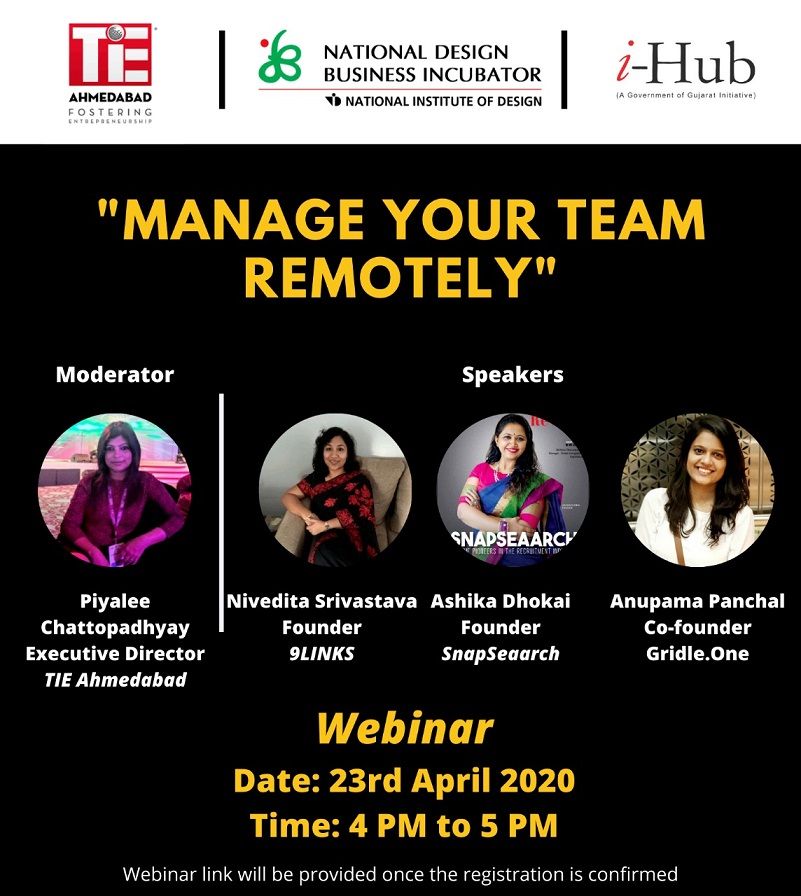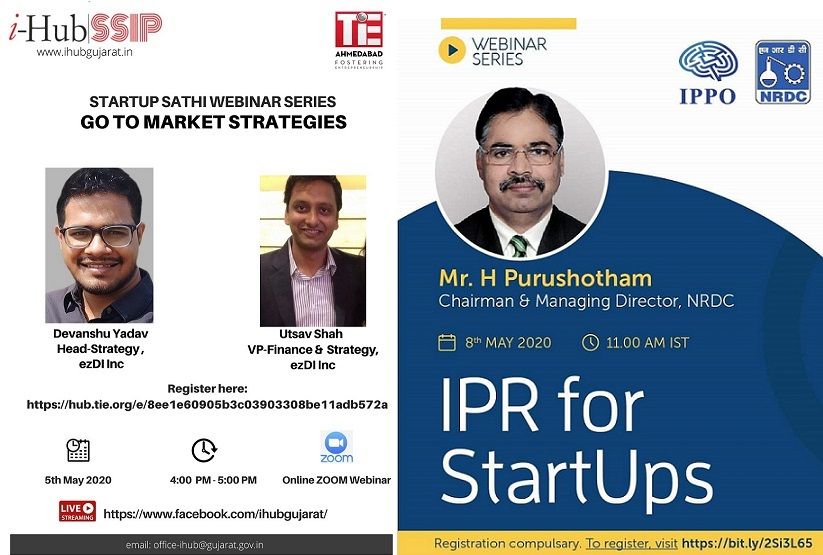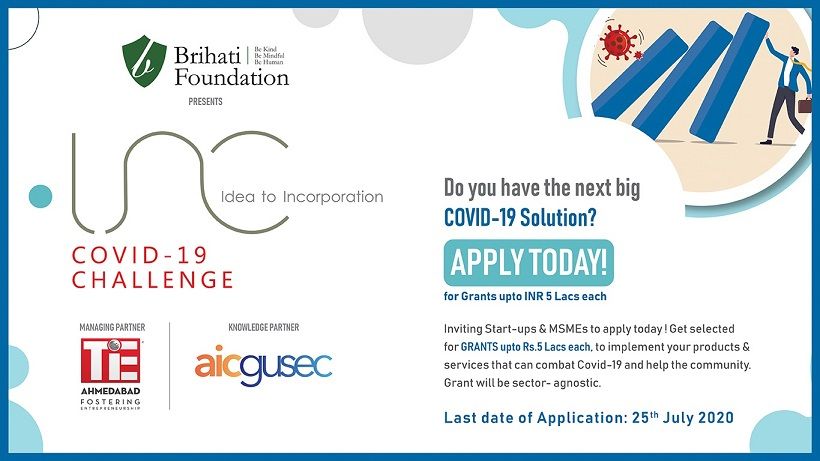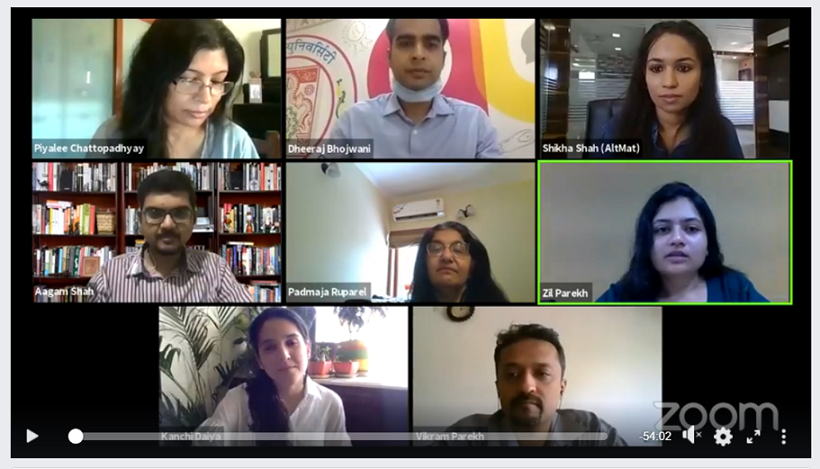The COVID-19 pandemic has dealt a heavy blow to businesses and societies around the world. But the spirit of resilience will triumph, and a range of entrepreneurship support organisations has risen to the challenge.

This includes TiE Ahmedabad, the local hub of the global network called The Indus Entrepreneurs, founded in Silicon Valley in 1992. See also our earlier profiles of resilience activities by TiE Global, as well as TiE chapters of Bangalore, Silicon Valley, Mumbai, Pune, Kerala, Hyderabad, and Kolkata.
Support for entrepreneurs
Over the past four months, TiE Ahmedabad organised over 25 programmes and events for startups. “We did most of our events in partnership with different organisations with the objective of helping entrepreneurs during the pandemic,” says Piyalee Chattopadhyay, Executive Director at TiE Ahmedabad, in a chat with YourStory.
Experiences and learnings were shared on how established companies are coping with the challenges, as some of them have weathered economic crises in the past. “We focused on the new ways of working, as many of them needed to facilitate change management, revisit cashflows, and revise funding requirements,” she explains.

For example, in the early crisis months of April and May, sessions were focused on new priorities and learnings as compared to past financial years. From April onwards through August, programmes and topics were offered based on inputs from members and ecosystem partners to fill knowledge and business gaps.
Online attendance for the webinars ranged from 120 to 200, with most participants being entrepreneurs. University participation was higher, and some events went live on social media as well.
A financial grant programme was launched with member organisation Brihati Foundation. “We have launched a COVID-19 Challenge for startups and MSMEs to encourage them to come up with innovative solutions to address pandemic problems in Gujarat,” Piyalee says.
Around five or six startups will be given a financial grant of up to Rs 5 lakh each. The final selection of the shortlisted applications, from 131 total submissions, is being planned in August.
Academic support
New opportunities and sectors also opened up during the crisis. “A number of universities have initiatives to support budding entrepreneurs and startups in early stages,” Piyalee says.
“TiE Ahmedabad is a knowledge partner for the Student Startup and Innovation Policy (SSIP) and Innovation Hub for the government of Gujarat. We have launched a programme called Startup Sathi,” she adds.
Under this banner, TiE Ahmedabad organised joint sessions for startups. “Though participation came from all over Gujarat, some members from other TiE chapters and faculty members of other colleges also attended online,” she recalls.
Examples of such webinars under the Startup Sathi banner included strategic tie-ups, creating winning business plans and go-to-market strategies, sales masterclasses, and the role of IP as the ‘X-factor.’ A one-week joint pre-masters bridge course on Entrepreneurship in the New Normal was held with Ganpat University.
Sessions on fundraising and investment were organised with GUSEC (Gujarat University Startup and Entrepreneurship Council), Padmaja Ruparel (Indian Angels Network), and Sushanto Mitro (Lead Angels). Hackathons were held with Swarrnim Startup and Innovation University and Pandit Deendayal Petroleum University.

Business and operations
“Managing teams remotely was a challenge. A lot of startups were struggling with the WFH (work from home) model, particularly with respect to productivity and team morale,” Piyalee observes. Sessions and panels helped address these issues and provide tips.
There were inspirational talks on staying local and thinking global. “We had sessions on leading in the new normal, featuring the journeys of industry leaders and women entrepreneurs,” she adds. Other sessions covered survival strategies for those with largely domestic (or international) customers.
Tech and IP
Tech and infrastructure optimisation topics were addressed by Jaimin Shah, Co-Founder and MD of Dev Information Technology, one of the top 10 Gujarat-based IT firms. “Many service-based SMEs wanted help with issues like data privacy and network needs during WFH,” Piyalee recalls.
Several sessions addressed the new emerging opportunities, such as finding customers via digital marketing and ecommerce. Trends ranging from deep tech to policy changes were covered.
A series on alternative energy solutions was organised in partnership with a member organisation. It was conducted by Akshat Khare, Founder of Nessa Illumination Technologies, which promotes green energy solutions.
This series covered investment strategies for solar rooftops, and LED as an investment in the LaaS model (lighting as a service). The CSR scenario is changing, thus opening up new opportunities for players in this field. The post-COVID-19 scenario also has a need for UVC (ultra-violet wavelength) products.
A series on intellectual property rights was organised with the National Research Development Corporation (NRDC) and IP Promotion Outreach (IPPO). It addressed issues relating to patent strategy and its limitations. It covered IPR for startups, as well as technology innovation related to COVID-19 and its societal impacts.

Challenges and opportunities
TiE Ahmedabad and its members helped entrepreneurs map challenges while also spotting opportunities during the pandemic. “I think the biggest challenge is our own fear to fight the battle and the amended way of working,” says Shruti Kushwah, Founder of Crealoons.com.
For those who have been working in fixed environments for years, it was a challenge to reduce operational cost, outsource talent and services, and accept virtual tools. “Overall, businesses like retail, hospitality, lifestyle, and event management will have to adapt,” she cautions.
She flags other challenges like lack of industry forecasts, supply chain disruption, and shortages of funds. “For businesses like us, it has turned into opportunities since more companies are striving to innovate in digital marketing, product development, IT services, and healthy foods,” Shruti adds.
Pharma, enterprise workflow, and other sectors riding the Atmanirbhar Bharat momentum are also gaining, according to Paresh Kariya, Director AIQ India, and former Director of Otis Elevators India.
Organisational capacity
With only two staff members, TiE Ahmedabad worked extensively with partners to target relevant audiences and for cost-sharing. “We focused only on key priority tasks,” Piyalee explains.
The TiE chapter has actually been adding new members each month, thanks to its events. “Lots of positive feedback has come from programme participants and members. They share their learnings and takeaways, which is always encouraging and makes us confident that we are moving in the right direction,” she proudly says.

Role of government
In many states, governments have been actively collaborating with startups during the crisis. “The Gujarat government is engaging with all supported startups in this pandemic period,” says Hiranmay Mahanta, CEO, I-Hub, Government of Gujarat.
There have been regular mentoring sessions addressing the challenges of startups in a virtual model. “Startups who have offerings to address the COVID-19 crisis are being engaged with public systems to solve challenges in fast-track mode. A few dozen startups have co-created solutions with municipal corporations,” he explains.
Special programmes like ‘Innovate while you Isolate’ were launched to scout startups and innovators in remote mode. Financial and deployment support was given to such teams.
Tips and advice
TiE members also share tips and advice for founders on issues like cashflow management and pivots. “What works well for us is converting capex to opex, and keeping costs flexible,” says Amit Khetan, Founder of AfterFirst.com, an IIM-A alumnus and an ex-corporate banker with Citigroup.
Other approaches are variable pay and incentives, and using co-working offices or WFH instead of expensive fixed leases. “Cross-functional training for all employees helps maximise collaboration and efficiency,” he adds. In addition to cash conservation, his company also maintains discipline about getting positive unit economics in a defined timeframe.
With respect to pivots, it is important to first sense differentiation needs from existing customers, advises Bhavin Bhagat, Co-Founder of IndiaBizForSale. “This would allow the pivot to get early traction from the same customers,” he says.
“When Snapdeal pivoted from a discount coupons company to an e-commerce marketplace, the consumers for coupons would have been the first to target for e-commerce too,” he explains.

Mental health
Mental fitness and agility are key for entrepreneurs in these uncertain times. This calls for a focus on near-term issues and long-term priorities.
“Take breaks from TV and social media and establish a mindfulness practice, like meditation,” advises Saurabh Mehta, TiE Ahmedabad President. Listening to motivational talks can help reduce some of the external noise.
“Schedule breaks from WFH. Choose audio-only participation sometimes. Have a dedicated space for work, it can help in mitigating fatigue. Wear more formal clothes to feel more professional during work routines,” he adds. It helps to go outside whenever possible, with social distancing.
“Set up long-term financial and career goals. Once a quarter, discuss with your superiors about advancement opportunities,” Saurabh suggests.

Online session on investing (Image credit: TiE Ahmedabad)
The road ahead
TiE Ahmedabad has a packed schedule ahead as well. For the month of August, the focus is on mentoring sessions as businesses are slowly heading towards a ‘new normal.’ Many Charter members have committed their time to guide and mentor the startups, according to Piyalee.
A three-series event on Venture Capital and Investments is being organised from August 20, with member organisation GVFL (formerly Gujarat Venture Finance Limited).
September is being planned as Networking Month. “We are looking forward to a session on how to take advantage of different avenues offered by TiE globally, besides virtual local networking for business,” Piyalee says.
Chirag Patel, past President of TiE Ahmedabad and Founder of Net4Nuts, will be conducting one of the sessions on networking. The TiE Women initiative has also been launched by TiE Ahmedabad.
“We are going with the flow and remaining dynamic enough to adapt to new ways as needed,” Piyalee signs off.
(Edited by Saheli Sen Gupta)
Want to make your startup journey smooth? YS Education brings a comprehensive Funding Course, where you also get a chance to pitch your business plan to top investors. Click here to know more.
Link : https://yourstory.com/2020/08/tie-ahmedabad-entrepreneur-resilience-coronavirus
Author :- Madanmohan Rao ( )
August 18, 2020 at 07:45AM
YourStory



